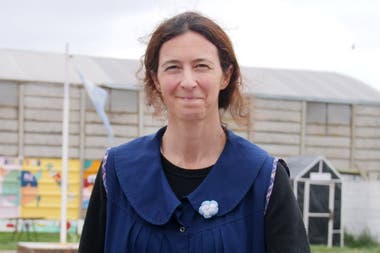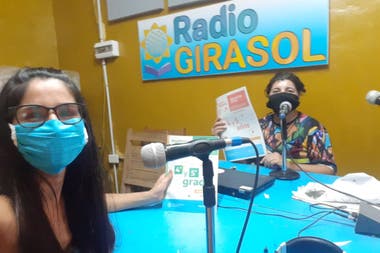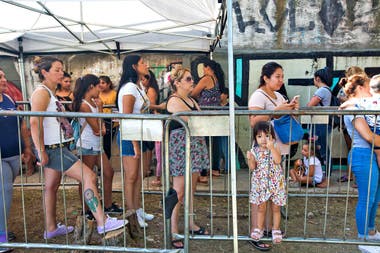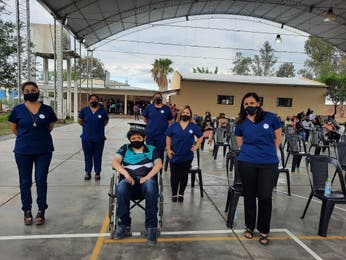The red dirt road makes the truck shake. Until Friday, March 13, when Débora Kuinaschuk, director of the rural school 340 from San Juan de la Sierra (Concepción de la Sierra department), in Misiones, notified families about the suspension of face-to-face classes due to the Covid-19 pandemic, the 45-kilometer journey to school it was an everyday ritual. Today she only does it every two weeks, but always with three other teachers -one of them, her sister Claudia- and the inevitable mate who accompanies them from Apóstoles, the city where they live. “Quarantine is a time of concern in general, it is not easy to go through these months without seeing the children. But we focus on accompanying families“says Débora.
They attend school 37 students, from kindergarten to seventh grade. “There are 28 families in total”, clarifies the director. Primary is organized in two linked cycles: from first to fourth grade and from fifth to seventh. “The pedagogical strategy that we implemented was based on selecting the topics, organizing the activities, printing them and delivering them every fortnight to each family, respecting the prevention protocol. Then came the Nation booklets, which we adapted to our context. It had to make content more flexible so that they are easier to capture from a distance “, he details.
The issue of communication, central in the framework of distance education, has enormous relevance in a rural town such as San Juan de la Sierra. No boy has a computer, although they learn with those at school and “with that of a relative in Posadas,” the capital, some 70 kilometers away. “Less than half of the families have Internet connectivity on their cell phonesOthers don’t have a phone signal, or sometimes neither. In many homes there is not even electricity, drinking water or a television “, points out Claudia Kuinaschuk, teacher in charge of the 2nd cycle. The problem extends to the institution, since given the low ground, there is no internet or signal there either of phone. “At some point along the way we already lose contact, until we return home,” explains the teacher.
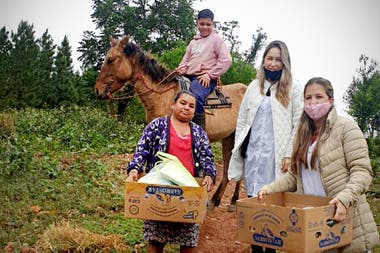
In that sense, the garden teacher, who lives within the neighborhood, “plays a very important role as an intermediary. He helps us with the activities, since the boys come to send us inquiries,” the teacher added. In the fortnightly meetings with the parents, they receive the activities carried out and deliver the corrected and new ones.
The other gap
In the neighborhood the meeting points are, in addition to the school, a church, a temple, a primary care center and a municipal multipurpose room. The relationship between teachers and families is close, but the fact of continuing the classes at a distance exacerbated existing challenges. “In the community of monte lmother is the one who plays the most important role in relation to the support of schooling, “says the director of the institution.” Many of them did not finish their primary educational careers, so their children’s homework is difficult. Parents and male children are dedicated almost exclusively to the fields, they are in charge of the household economy “, Débora graphs.
How the teachers of rural school 340 in San Juan de la Sierra, in Misiones, work, where no boy has computers and there is practically no telephone or Internet signal
01:55
At this time of year, the teaching sisters rescued with satisfaction the fact that the educational community has managed to adapt and that there is educational continuity, but at the beginning “it was necessary to ask the families to have more contact with their children. It was difficult for them to understand that maybe you had to lose work hours “, clarifies the director. It was a process that took time, since when the quarantine started, many tasks returned with incomplete activities. Different issues arose there, from the lack of school supplies, such as the transporter, until the adults did not know how to use them.
Given the difficulty of some parents to ask for help, in many cases the teachers communicate directly with the children. “Always we seek the solution to each problemWe form a great work team together with the families, “says Claudia.
A necessary change
In the mountains the culture of work is an imperative. Beyond the undeniable socioeconomic issues, teachers focus on promote a change of look regarding the importance of education. “About 60% of our students go to secondary school,” says the principal. “There is a multipurpose school about 10 kilometers away, in the city of Cerro Azul. Some go to an agricultural technical school, which is a private one 20 kilometers away, in Santa María. But another 40% are dedicated to work; it is installed that that it’s the most important thing. “
Most of the men work in the fields, in a sugar cooperative or in the local forestry. The least are municipal: “The ‘middle class’ of the colony,” says Débora. “The women,” he continues, “if not they work in the cooperative, they raise pigs, grow vegetables, beets, chard, onion, cabbage, carrots, lettuce. The things that are given in the place and that the boys also learn to grow at school “.
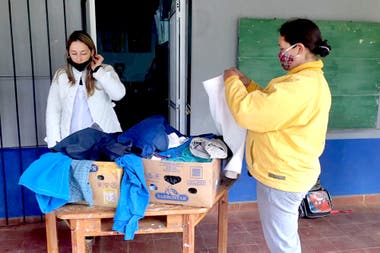
A fundamental support for the community and the school 340 is the Manos Misioneras foundation that, among other initiatives, supports the school cafeteria. In the quarantine, the NGO distributed to the families, with the truck that it uses to transport the students, the merchandise that was going to be used in the dining room. “For Children’s Day, for example, when the parents came to get their homework, we also gave them chocolate, bills and sweets for the children,” says Claudia.
The teachers also worry about being a emotional support for your students right now. “We send them activities that we know they can do around the house, like recipes for jams, cookies or play dough and homemade paint, different things they are used to and that surprised them. O readings to share with parents and grandparents“continues the teacher.” We also send them a daily message of encouragement. They give us back photos taking tereré, they tell us they miss us. School is the only place they visit outside the home. “
With no date of return to classes and within the framework of the national and provincial protocol, the school works to adapt possible measures to its rural context. “That we are concerned, and a lot, because we do not have service personnel who are in charge of hygiene and cleaning of the school; we had been doing it thanks to the collaboration of parents and teachers “, Débora says.
While they dream “with that kiss and hug of the reunion”, they highlight the good thing of having been able to handle the situation: “For the boys the novelty is that the mother becomes a teacher, and for us, adapt the content and strengthen ties with the families There is nothing like the blackboard, but we did it. “
To collaborate with the school
Fundación Manos Misioneras collaborates with rural schools in Misiones, including 340 in San Juan de la Sierra. They take care of the transport of students, offer school canteens, footwear and clothing for more than 400 boys and carry out teacher training. They also promote community development through micro-enterprises and workshops on health and prevention of gender violence, among others. They currently carry out their annual fundraising campaign, aimed at improving connection and communication in the towns of the mountain.
More information
La Nación Foundation Award for Education: Organized by Fundación La Nación together with Banco Galicia and Osde, it launched its 14th edition with the support of Cimientos, Proyecto Educar 2050, VIACOM-CBS, Fundación Varkey, Enseñá x Argentina and the University of San Andrés . This year, it seeks to highlight the incessant work of teachers who, during the pandemic, develop innovative pedagogical strategies to ensure the educational continuity of their students in vulnerable contexts. The application is open until October 2, 2020 and only initiatives that have been developed in the context of the pandemic can be submitted. Among the participating schools, three winners will be selected who will receive 300,000 pesos each and, also, three special mentions will be awarded that will receive 100,000 pesos each to invest in the training of the teachers involved and the equipment of the school to facilitate access to the Communication technologies. More information: write to [email protected] or call the cell phone: 11-4915-9533. Terms and conditions.
.
Publicado en el diario La Nación

